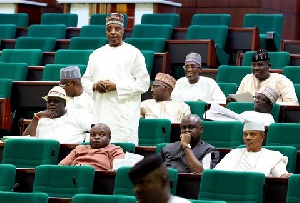 File photo: Nigerian politicians have been in the business of defecting from one party to another
File photo: Nigerian politicians have been in the business of defecting from one party to another
One of the challenges to the sustainability of democracy and the evolution of a robust political system and process in Nigeria is the gale of defections in the country.
This has to a large scale led to a lean political base in the country, that are consistent in the political philosophies, beliefs, values, and convictions.
Developed democracies like the United States, Germany, France, and United Kingdom have politicians with over 3 decades of experience in politics without wavering in party affiliations and ideologies.
In this article we identify 7 reasons why politicians defect in Nigeria
What is Defection?
From the Wikipedia definition, and in politics a defector is a person who gives up allegiance to one state in exchange for allegiance to another, in a way that is considered illegitimate by the first state. It involves abandoning a person, cause, or doctrine to which one is bound by some tie, as of allegiance or duty.
This term is also applied, often pejoratively, to anyone who switches loyalty to another religion, sports, team, political party, or other rival faction. In that sense, the defector is often considered a traitor by their original side.
Lack of Political Ideology
According to Olarenwaju, John Shola in his contribution on “Political Parties and Poverty of Ideology in Nigeria” asserts that “Political ideology is an important vehicle of a political party. There is no political party without one or two manifestoes during their electioneering campaign, Nigerian parties seem to be suffering from ideological barreness unlike what is obtainable in advanced democracy”.
He opined “Unless leaders of political parties form and maintain political ideologies on their stand, cross carpeting from one party to another will continue to exist, it is only in Nigerian that candidate worked against their parties when they failed to secure parties tickets to contest elections”.
This is one of the major reasons why politicians defect in Nigeria, the dearth of political ideologies in parties and the lack of political philosophies also on the part of the politicians, is leading them to move from one party to another.
The poverty of ideology has continued to affect the fourth republic Nigerian democratic system.
Political Interest
According to Hilke Rebenstorf in his work on “Political Interest: Its Meaning and General Development” in terms of political sociology, political interest is the main component of political motivation, a variable indicating ability in ideological conceptualization, which is essential for participation in the democratic process (Klingemann 1979).
Thus, political interest is a necessary precondition for the desired characteristics of a responsible and democratic citizen: critical loyalty, ability, and readiness for political participation.
Political interest leads people to weigh ideological positions, to assess their pros and cons, and finally to make a commitment and achieve political identity. Without political interest, political identity stays diffuse: not knowing what to think, not knowing what to believe, not knowing where one's own commitments are.
In the Nigerian context, a politician will defect from one political party to another, when his or her political interest is no longer guaranteed.
The Pursuit of Political Ambition
According to the American Political science review, political ambition or the desire to seek higher office is shown to develop as a product of the investments that politicians make in their political careers, and the investments are shown to be associated with the structural characteristics of community size and electoral competitiveness.
It, therefore, becomes a challenge for some politicians when their aspirations in a particular political party is either scuttled due to the issues of the imposition of candidates or structures that will not support them.
Political Agenda
A political agenda is a clear cut policy direction and philosophy that guides the strategies, ideologies and plans of a political party that shapes its governance strategies when it is in the helm of affairs of a Local Government, State or Nation.
When a political party is not driving a convincing agenda that impacts the socio-economic space, politicians defect to avoid being associated with failures or poorly implemented policies.
Internal Party Division
Internal party divisions are one of the major reasons politicians defect in Nigeria, and this is manifest in the various factions and executives in a party. When a particular faction feels sidelined and ostracized from political activities, they can resort to defection to seek better opportunities.
Political parties that lack the capacity to achieve internal cohesion are the worst hit by defections, and this is always massive because of the aggrieved factions who leave the party.
Lack of Transparency in Party Processes
The lack of transparency in the processes of political parties are part of the major reasons why politicians defect in Nigeria. One of the major areas where this is witnessed in Nigeria are in party primaries or the national convention.
This explains why politicians will leave a party they have contributed in building all because they have lost confidence in the leadership and process of the party.
Lack of Trust in Party Hierarchy
The leadership of a political party is very critical, it either shapes or destabilizes the structure or alliances that are in the party and when there are issues and the hierarchy cannot resolve it, politicians defect.
It is always difficult to show complete loyalty in a party, when the leadership cannot be trusted and this is why strategic political parties are meticulous and conscious of the kind of leaders that are elected to lead the party.